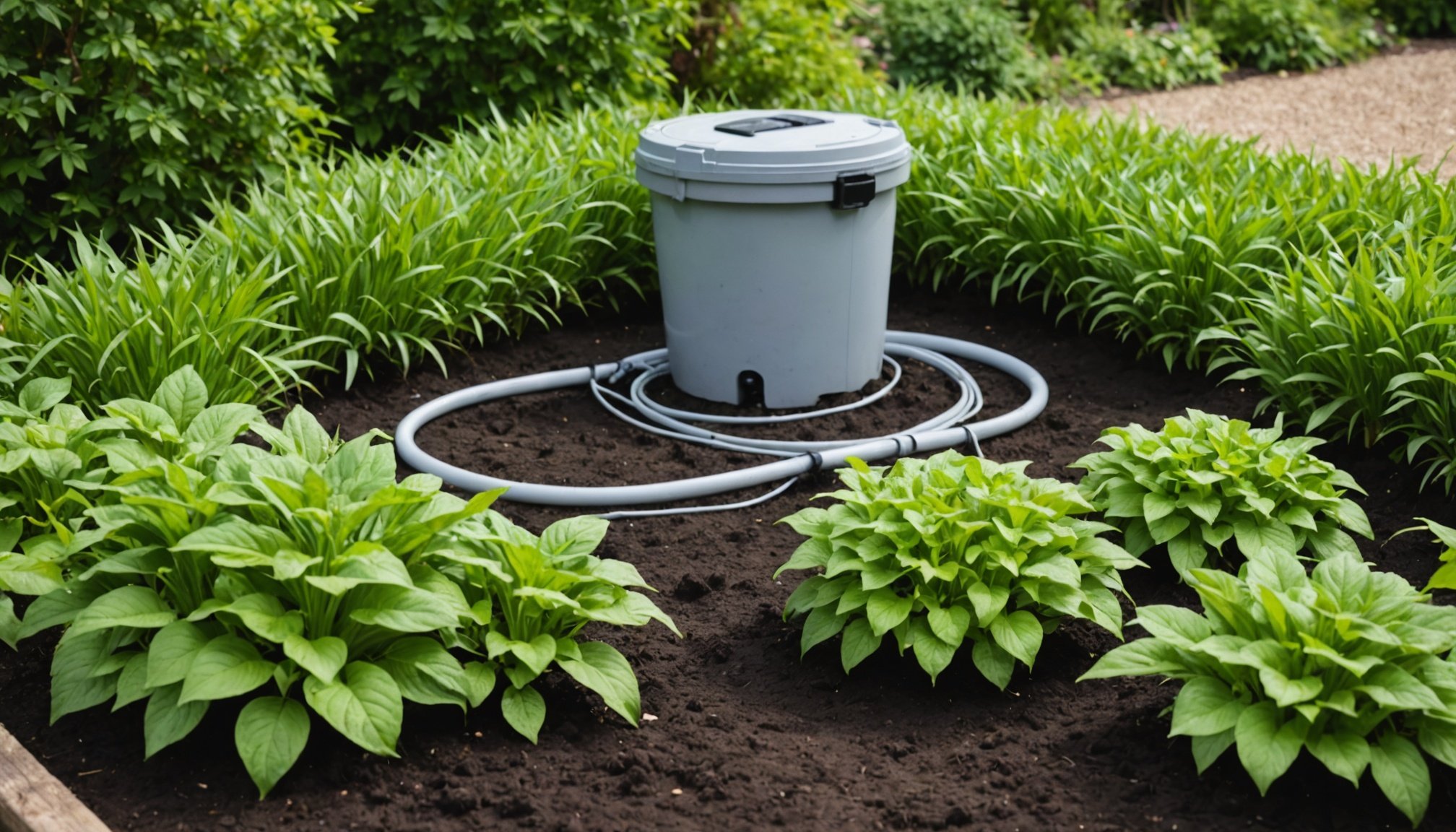If you’re in the UK and are thinking of adopting a more sustainable approach to watering your garden, an excellent solution is implementing a greywater system. Greywater is all the household wastewater, excluding toilet waste, that is produced from activities such as washing dishes, bathing, and laundry. A greywater system collects this water and diverts it from your mains water system to be used for irrigation.
This article will guide you on how to install such a system, the benefits it will bring to your garden and the environment, as well as how to maintain it correctly.
Avez-vous vu cela : Seamlessly Integrating Solar Thermal Panels with Your Existing Hot Water System: A Guide for UK Homeowners
Understanding Greywater Systems
Greywater systems are an under-utilised yet effective solution to reducing the demand on mains water. By recycling household water for garden use, you not only help conserve water but also reap the benefits of nutrient-rich water to nourish your garden.
Greywater systems can be as simple as collecting water in a bucket or as complex as a permanent plumbing installation that diverts water from your house to your garden. Regardless of the complexity, the principle remains the same: reusing water that would otherwise be wasted.
Sujet a lire : Unveiling the essentials of insulated kingdom products
Selecting the right system
Choosing the right greywater system depends on a number of factors, including the size of your garden, the type of plants you have, and the amount of water your household generates.
For smaller gardens, a manual bucket system might suffice. This involves collecting water from showers or washing machines in a bucket and using it to water your garden. Remember, if you’re using this method, don’t use water that’s been in contact with harsh chemicals or non-biodegradable substances.
For larger gardens or for more convenience, consider a direct diversion system. This involves diverting water from your household plumbing directly to your garden. Keep in mind, greywater must be used within 24 hours to prevent bacteria growth, so this system is best suited to gardens that require daily watering.
The third type, and the most complex, is the greywater treatment system. This involves treating the greywater to a standard where it can be stored and used for longer periods. This system is ideal for larger properties and those looking to maximise their water recycling efforts.
Installation and Maintenance
Once you’ve chosen the right system for your needs, the next step is installation. It’s crucial to ensure that your greywater system is correctly installed to prevent any potential health risks or damage to your garden.
For a bucket system, no installation is required, simply collect the water in a bucket and use it to irrigate your plants. If you’re opting for a direct diversion or treatment system, professional installation is recommended.
Maintenance of your greywater system is crucial to its longevity and effectiveness. Regular checks should be carried out on the system to ensure it’s working correctly. The greywater should also be filtered regularly to keep out unwanted particles.
Remember, it’s important to change the products you use if you’re implementing a greywater system. Opt for natural or biodegradable cleaning products to ensure the water you’re using isn’t harmful to your garden.
Benefits of Greywater System
The most significant benefit of implementing a greywater system is the conservation of water. In the UK, where water scarcity can be a problem during the summer months, using greywater for irrigation can alleviate the demand on the mains water supply.
Furthermore, greywater offers a source of nutrient-rich water for your garden. Nutrients such as nitrogen and phosphorus that are present in household wastewater can benefit your plants’ growth and health.
Lastly, by using greywater systems, you contribute to a more sustainable and eco-friendly environment. This practice reduces the amount of wastewater that enters the sewage system, which subsequently reduces the energy and resources used to treat this water.
Overcoming Potential Challenges
While the benefits of a greywater system are many, you might encounter a few challenges along the way.
Firstly, not all plants will respond well to greywater irrigation. Some plants may be sensitive to the higher nutrient content, or the pH balance of greywater. It’s advisable to research your garden plants and their specific water needs before implementing a greywater system.
Secondly, some areas in the UK have regulations in place regarding greywater systems, particularly for the more complex systems. You will need to check with your local council to ensure that you’re compliant with their regulations.
Lastly, it requires a change of habit and a commitment to water conservation. You may need to change the products you use in your household to ones that are safe for greywater use. It also requires a commitment to maintaining your system regularly to ensure it’s working optimally.
In conclusion, implementing a greywater system for your garden irrigation in the UK is an achievable and worthwhile goal. With proper planning, installation, and maintenance, you can enjoy the multiple benefits that greywater recycling brings to your garden and the environment.
Cost and Feasibility of Greywater Systems
Investing in a greywater system comes with both initial and ongoing costs. For a simple bucket system, the cost is minimal, as no special equipment is required. However, for direct diversion and treatment systems, the cost can be considerable. You’ll need to factor in the cost of professional installation, regular maintenance, and potential modifications to your existing plumbing setup.
Despite the initial outlay, the long-term financial benefits of reduced water bills can make greywater systems a cost-effective solution. Plus, with the rise in awareness about environmental sustainability, many local authorities and water companies in the UK offer incentives for households implementing water conservation measures.
Another crucial factor to consider when looking at greywater systems is the feasibility from a practical point of view. You will need to have enough space to install the necessary equipment, especially for treatment systems.
Regular maintenance is key to keeping your greywater system functioning optimally. This includes regular filter changes, system checks, and adjustments to avoid over-saturation of your garden soil. As part of your maintenance routine, keep an eye on your plants’ health to ensure they are responding well to greywater irrigation.
Greywater Vs. Rainwater Harvesting
Another sustainable method of garden irrigation is rainwater harvesting. This involves collecting rainwater from your roof and storing it in a water butt for future use. Rainwater harvesting can be a viable alternative or complement to a greywater system.
Unlike greywater, rainwater does not contain detergents or other potential contaminants from household use, so it can be stored for longer periods without treatment. Rainwater is also softer than mains water and is free of chlorine, making it ideal for watering acid-loving plants.
However, the effectiveness of rainwater harvesting is highly dependent on the local climate. In the UK, while there is generally adequate rainfall during the winter months, rainwater supplies can be depleted during the drier summer months when garden watering is most needed.
Conclusion
In our modern, resource-conscious world, effectively recycling and reusing household water with a greywater system is a tangible step towards environmental sustainability. Not only does it provide a solution to water scarcity issues, but it also brings financial benefits in the form of reduced water bills.
The selection of the right greywater system, proper installation, and diligent maintenance are the three key steps in making this transition. And while there might be challenges along the way, the positive impact on your garden’s health and the environment outweighs these potential hurdles.
The UK, with its varying rainfall patterns and increasing awareness about water conservation, is well-poised to adopt greywater recycling as a standard practice in homes. Whether you choose to implement a simple bucket system or opt for a more complex treatment system, the benefits of this sustainable practice are clear.
So, take the plunge, do your bit for the environment, and start reaping the rewards of a greywater system in your garden today!











